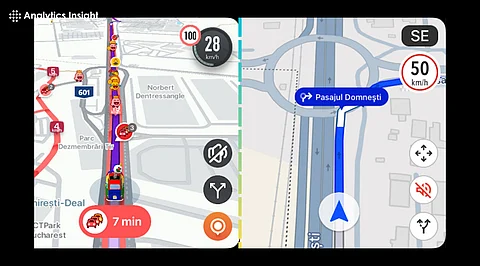

Navigation apps have evolved a great deal since the earlier times. In 2025, the biggest names remain Waze and Google Maps. Both possess high-end capabilities, but serve somewhat differently towards the requirements of the users. In this article, their key differences will be discussed to help the users decide which app offers a better experience for everyday commuting, navigation, and real-time traffic management.
Ease of use is crucial when looking at a navigation app. Google Maps has a clean, no-frills interface. Google Maps maintains complete maps, proper icons, and search features that are not hard to find. For beginners or even individuals who just want general directions, Google Maps provides simplicity but with a lot of emphasis on ease of use.
Waze is more social. The screen is brighter and more active, with other drivers' messages on the screen in real time. This gives a sense of engagement and activity, but can be distracting to some users, especially on complex routes.
Overall, Google Maps is better at simplicity and clarity, while Waze is for users who prefer interactive, real-time data along the way.
One of the leading motivations for users to use navigation apps is to avoid traffic. Both Waze and Google Maps in 2025 are best at live traffic updates but in different capacities.
Google Maps has data both from its wide range of mapping technology and user data. It provides route suggestions, estimated travel time, and information regarding road blockages or accidents. The app re-directs automatically if a faster route is identified along the journey.
Waze, meanwhile, survives on crowd-sourced data. It is updated with real-time input from its own active driver population. Speed cameras, accidents, or road hazards often flash up on Waze. For motorists who seek second-by-second inputs from users, Waze remains an option of choice.
Accuracy is a deciding characteristic of navigation software. Google Maps' satellite imagery of high resolution and advanced mapping information provides extremely accurate navigation in urban and rural areas. It offers turn-by-turn routes with smooth interfacing between different transport modes such as walking, cycling, and public transit.
Waze, although precise in congested areas, tends to be lacking in rural areas because it relies on community contributions. If the number of users is low in a specific area, the quality of the updates is compromised. This renders Google Maps more dependable in less populated areas or in unknown territories.
When considering overall accuracy, Google Maps takes the lead, but Waze is more suited to metropolitan regions with high driver concentration.
Users have placed customization on a top priority. Google Maps offers the support of features such as street view, restaurant recommendations, and live business reviews. The app allows users to download maps and use them offline, reminders, and personalized lists of favorite locations.
Waze specializes in traffic features. Waze allows drivers to select from a variety of routes, receive voice-guided instructions with voice personalization, and get live traffic updates from their surroundings. The level of interaction that Waze offers is appealing to drivers who like personalizing their routes or receiving real-time information instead of static information.
For usability and customization, the choice depends on personal preferences. Google Maps excels in general usability, while Waze focuses more on traffic management and real-time interaction.
Both apps are well integrated with other apps. Google Maps is highly integrated with other Google apps like Google Calendar and Google Assistant. It offers a high level of synergy across devices, allowing users to synchronize saved locations, trips, and settings.
Waze, being less comprehensive in app integration, does however support the likes of Spotify and even certain in-car implementations for a hand-free experience. For consumers deeply entrenched in the Google ecosystem, Google Maps is the way to go. For consumers who focus most on commute-centric integrations, Waze is a suitable alternative.
Both Google Maps and Waze remain the behemoths of navigation in 2025. Google Maps is characterized by accuracy, feature-fullness, and availability, all of which contribute to it being a great general-purpose app. Waze offers a better real-time experience to users who are willing to get updates and traffic information from others.
The best app is dependent upon the driving pattern of the individual. For a common commuter who likes simplicity along with precision, Google Maps stands out. If one lives off real-time traffic analysis and expert opinions from members, Waze is the clear winner.
Join our WhatsApp Channel to get the latest news, exclusives and videos on WhatsApp
